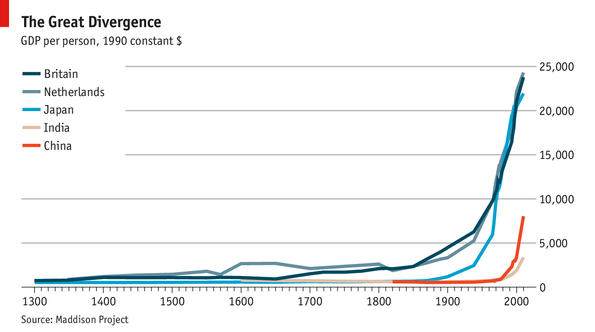Featured Article:The "Great Divergence" Redefined: the Rise and Fall of the West and the Recovery of China
By
2014, Vol. 6 No. 09 | pg. 1/3 | »
IN THIS ARTICLE
KEYWORDS
AbstractUp until the 19th century, China held a position as a great world power. However, for the last two hundred years the West has dominated the world technologically, economically, and politically. The point at which the West began its relative dominance over all other world civilizations is known as "the Great Divergence." Currently, a steady change has been developing in China. Not only has China caught up to the West but also China's economy is continuing to accelerate at a rapid rate and may even surpass the West in the near future. One of the main reasons for the "Great Divergence" was an underlying "Cultural Divergence," which began as far back as the "Axial Age" (c. 800-200 BCE). This "Cultural Divergence" was due to the beginning of the western philosophies of Socrates, Plato, and Aristotle in contrast to those of Confucius in China. Understanding this "Cultural Divergence" is relevant today because it helps explain China's lag compared to the West, its recent ascent in economic power, and the impact of this cultural perspective in economic development. The West (Western Europe and by extension the United States) has led the world in technological, economic, political and social advancement over the past two hundred years, eclipsing all other world civilizations. The origins of this dominance is often referred to as the "Great Divergence," a phrase coined by the late American political scientist Samuel P. Huntington.1 However, prior to 1800 China was the world leader in technology, commerce, and political power. China is currently catching up to the West and, according to some predictions, may soon regain its role as the dominant world influence. Avoiding a Eurocentric2 historical account, three questions need to be addressed: first, how do we account for the rapid economic development of 19th century Western Europe in comparison to China? Second, why did China begin to lag behind the West during the past two centuries? Finally, how do we explain the recent return of China to global prominence? Established scholars such as Jared Diamond and Robert Marks have produced compelling non-Eurocentric accounts of the "Great Divergence." However, these models can be overly reductive and incomplete. Both authors provide explanations that stem ultimately from geographical accident. Research suggests that what is overlooked in these corrective models is the historical impact of human culture. As such, it seems more appropriate to redefine the "Great Divergence" as a "Cultural Divergence" that can be linked to the contrasting ideologies of the West and those of China. Further, the roots of this divergence may lie not in the 19th century, but actually run as far back as the "Axial Age" (c. 800-200 BCE) and the founding of Confucianism. In the end, it is clear that Confucianism must be a key component in the explanation of not only the "Great Divergence," but also China's recent rapid return to world eminence.Classic Arguments for the "Great Divergence"Jared Diamond, in Guns, Germs, and Steel (1997), argues that the reason for the "Great Divergence" is that "History followed different courses for different peoples because of differences among peoples' environments, not because of biological differences among peoples themselves"'5Additionally, Diamond sees the causes for the "Great Divergence" as primarily environmental (even just accidents of geography), mediated by agriculture, population size, social organization, and technology. Essentially, Jared Diamond believes that "environment molds history."3 According to Jared Diamond, this is the ultimate cause of the rise and dominance of Europe. Diamond describes that there were both ultimate and proximate factors that explain "the broadest patterns of history."4 The key difference between the West and China is that European society has always been focused on the "individual," whereas the Chinese have always centered their focus on "relationships," the interaction between people, or "guanxi 關係." The Chinese have been fundamentally a "relationship-based" society that places emphasis on taking care of the community as a whole. Diamond explains this unequal distribution of power between Eurasia and the Americas (the ultimate factors) are the natural conditions that led to the rise of food production. Those geographical areas of the world that allowed agricultural based societies to be established early on quickly gained a permanent advantage in history. As a result, these ultimate factors led to, in the future, regional variations in technology, social organization, and heath. These ultimate factors were followed by proximate causes, which explain why different environments move at different rates in the acquisition of agriculture, and explaining how the resulting differences largely determined the fate of different peoples.5 One of his examples for proximate causes include Francisco Pizarro's conquest over the Incan empire in 1532, by means of superior steel weapons and armor, horses and cavalry, centralized political organization and a written form of communication. Most importantly new diseases (smallpox and other epidemics) the Spanish brought with them to the Americas. Environmental historian of China, Robert B. Marks, in The Origins of the Modern World (2007), addresses this "Great Divergence" providing his own non-Eurocentric explanation. Rather Marks gives a polycentric one, characterizing the modern outcome as anticipation between two forces that emerged after 1400: nation-states and global capitalism. He argues that the outcome (the West came to dominate after the middle-1800s) resulted from historical conjunctures, contingencies, and accidents. Therefore, it was in this way that by 1900, the foundation for the existing system of nation-states, global capitalism, and the growing gap between rich and poor areas had developed.6 Marks argues that Western dominance did not result from inherent superiority of European culture, values, and institutions, but from the conjuncture of European marginality in the world economy and diseases that killed New World natives. Marks argues that during the 1800s, industrial development growing out of a conjunctures of European nation-state expansion, mercantilist policies, and the convenient placement of coal, provided the implements necessary for establishing powerful empires. Marks gives the example of another such conjuncture by stating that Europeans came to eclipse the two formal world economies of China and India because they possessed iron-hulled, steam-powered gunboats and guns, along with the capability to produce cotton goods using machinery. He claims that as other European states followed England's lead and industrialized, in a sense, China and India "de-industrialized."7 The rise of the West, argues Marks, was contingent upon events outside of Europe. The narrative for the "rise of the West" is merely a story of "how some states and peoples benefitted from historically contingent events and geography to be able, at a certain point in time (a historical conjuncture), to dominate others and to accumulate wealth and power," Marks explains, "There is no more mystery in it than that . . . those who have benefited should be humbled by the actual sources of their good fortune, and those who have not should take heart that in the future new contingencies may well favor them."8
An example of a contingent factor he gives is the fact that Columbus stumbled upon America where large amounts of American silver happened to exist and was made available to Europe at the same time as China happened to "remonetize its economy using silver"9 and thus depended on silver-based monetary system. Another contingent factor Marks provides is that Europeans created a labor force by enslaving peoples in Africa using them to mine silver in the New World and then using the same labor system on the plantations.10 Robert B. Marks also claims that accidents outside of human agency played a major role in the reason for the rise of the West. An example he uses is climate; however, his primary example is the location of coal. He explains that, unlike Great Britain, the China did not have coal supplies in close proximity to those who might utilize coal. –"The story of coal and its relationship to industrialization."11 Although Marks does argue that conjuncture, contingency, and accident leave open the possibility for human agency. Economist David S. Landes, of The Wealth and Poverty of Nations (1999), unabashedly prefers to revive the conventional Western interpretation to other explanations by taking a Eurocentric position supporting the "European Miracle."12 Landes explores a variety of reasons for the West's successes. One reason Landes emphasizes is climate condition. He explains that tropical countries were at a disadvantage to others, such as those in Western Europe, because they experienced oppressive heat. Additionally, the reason why Western Europe was able to create a "modern world" of rapid economic growth and perpetual technological advancement was due to a variety of attributes it possessed that other less developed world civilizations lacked. For instance, he explains that Western markets were much freer and had political systems that were more tolerant and had limits to government power. The West was much more concerned with individual freedom, with civil liberties, and for the respect of women's rights. However, he argues that the most important attribute of all was culture. "If we learn anything from the history of economic development," Landes says, "it is that culture makes all the difference."13 In terms of Western culture, Landes is an ardent believer in the "Protestant work ethic" as the driving force behind the rise of capitalism. As such, this combination of attributes possessed by Western Europe resulted in a greater respect for property rights (security of private property), a more open-minded view toward exploration, innovation and invention, scientific and technological advances, and a greater willingness to accept the notion that social self-worth was based on its commercial success. Although Landes' reasons are backed by a significant amount of evidence, other scholars have been quite critical of the arguments in his book: "The intellectual weakness of the approach taken, its lack of theoretical basis, the all-embracing opportunism of its Eurocentric infatuation, the special 'easiness' of its empirical version of prejudiced economic history, make this book a blunder of epic proportions, supportive of European arrogance, dismissive of the peoples still left without history."14Continued on Next Page » Suggested Reading from Inquiries Journal
Inquiries Journal provides undergraduate and graduate students around the world a platform for the wide dissemination of academic work over a range of core disciplines. Representing the work of students from hundreds of institutions around the globe, Inquiries Journal's large database of academic articles is completely free. Learn more | Blog | Submit Latest in History |




















